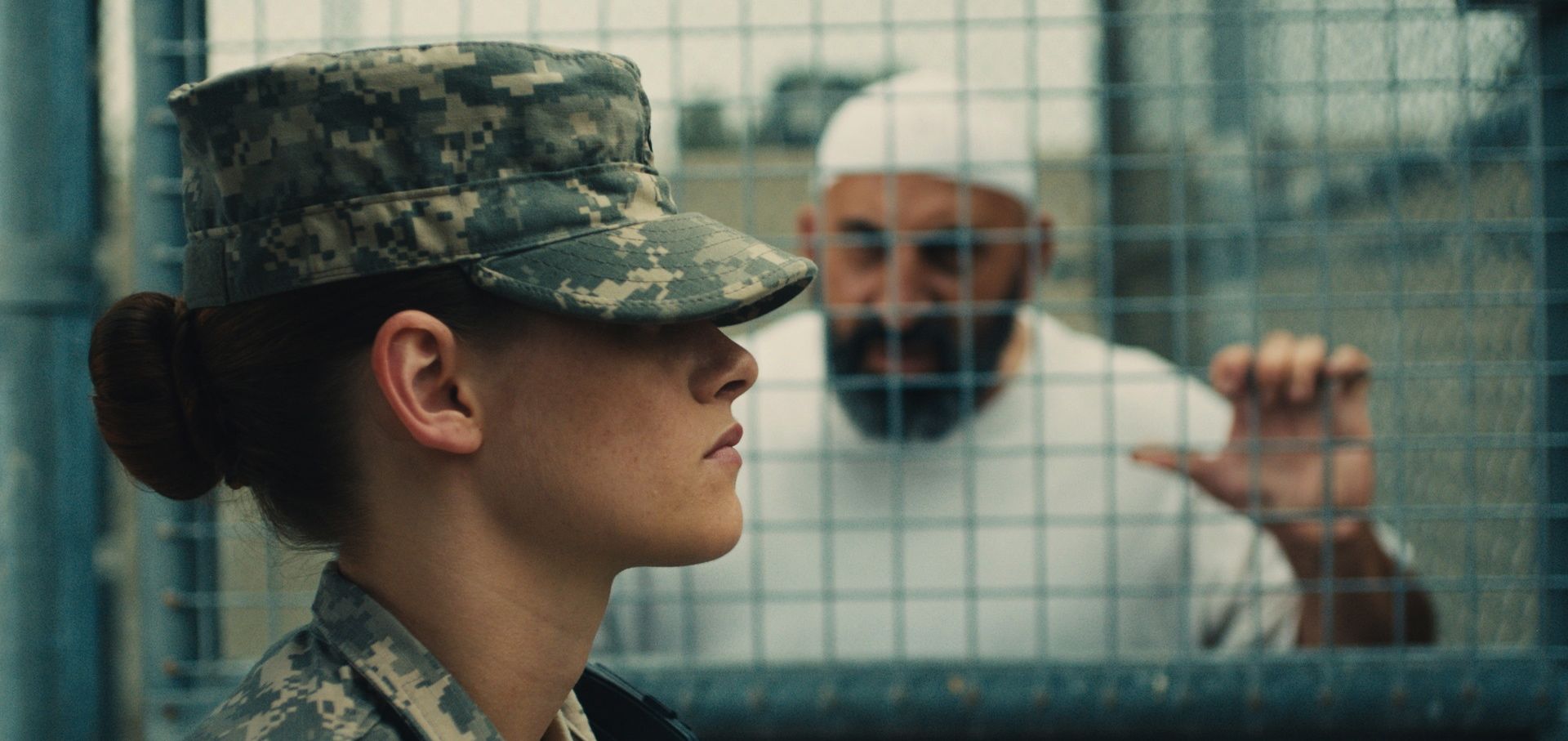
Camp X-Ray is a strange, shape-shifting film – despite a high concept premise that could be moulded into Oscar material in other (perhaps lesser) hands, it’s a film that is ultimately elevated and changed by its central performance. With an often obvious, ham-fisted script often unconvincing in its relative simple didacticism, the film almost reframes itself around its greatest strength – Kristen Stewart’s performance – to something with moments of feeling and introspection, and something occasionally special, particularly when veering away from the A to B structure of the screenplay that can otherwise feel a bit clunky.
The film opens with a shot of 9/11 on an old tube television, followed by a stark montage of three captives with black bags over their heads transported to the detention centre – an effective reminder of the fascination with images that defined the War On Terror for much of the previous decade. Cutting to eight years later, Stewart plays Private Amy Cole, a young army recruit assigned as a guard to Guantanamo Bay. Like so many military agents of plot exposition before him, a commanding officer introduces Cole and us to the detention facility – their job is not to punish, but to protect. In a near Orwellian use of language, terror suspects kept there are referred to as detainees, not prisoners – “Prisoners are subject to the Geneva Convention” Cole remarks to another guard, “detainees are not”. The number one rule, of course, is to not engage with the detainees in any way or disclose any sort of information to them. On the one hand this is ostensibly to avoid any tricks or manipulation the detainees may attempt, yet on a broader, ideological level the film clearly displays this as a means to avoid personification or sympathy with these same people.
Stewart slowly gets into the routine, following orders and adjusting to life in the compound. As promised by the high concept premise, she meets one prisoner Ali (Peyman Mooadi, The Separation) who seems a little different – a voracious reader of books, with a professed interest in Amy’s life. Slowly Cole sees there may be a sensitive side to Ali, and that things may be less morally clear cut than she first imagined, which goes against everything her superiors and colleagues let her believe. This storyline proceeds roughly as one might expect, as the two individual learn more about one another, a friendship forged in the most extreme circumstances. Mooadi is an able enough actor to add depth where the script doesn’t, but this central relationship feels like an invention of screenwriting fantasy. Also, the fact that Mooadi’s character is so morally righteous and likeable (and problematically he is distinguished as coming from Germany rather than the Middle East, an unfortunate inference that I don’t think the writers realised played as tackily as it does) especially contrasted with the 1 dimensional, ranting cellmate who is the only other detainee we see, means the screenplay is ultimately too simplistic to really digest.
However, Kristen Stewart’s performance lifts the film significantly – her famed moody and sensitive screen presence is a perfect fit in what becomes a layered and nuanced performance. Cole is someone afraid and alone, yet has to mask this behind an air of steely confidence and indifference in front of the detainees. In going about her everyday activities we see a vulnerability and confusion, and the best scenes are on Stewart alone – the film hinges on close-ups, where she conveys so many emotions through her face and demeanour that it’s clear this is a character coming to terms with her role here and her life more generally. This is less a film about a conflicted Guantanamo Bay guard than a broader film about a young person growing considerably in their first job, just that this one happens to be particularly difficult. Similarly during scenes where she attempts to get along with the fellow guards, whether matching them for drinks or during a confusing sexual encounter with another soldier, Cole is a character working out who she is in and her purpose there. In voiceover later she recounts how she signed up to be a part of something and make a difference – something we already sensed early on – and becomes disillusioned as she grows into her post.
While the film’s broadly painted themes will seem well-worn and tame to the audience – that in these circumstances there is no black and white and that individuals have their own stories, etc. However Stewart’s performance as essentially a kid growing up and learning these things for the first time has a sincerity and authenticity that resonates. That is to say, we might not learn anything from the experience, but seeing a character come to understand the world as a more complex place and struggling to understand her own place within it makes this film more worthwhile than the premise suggests, and credit is due almost entirely to Stewart for making this aspect work as well as it does.
